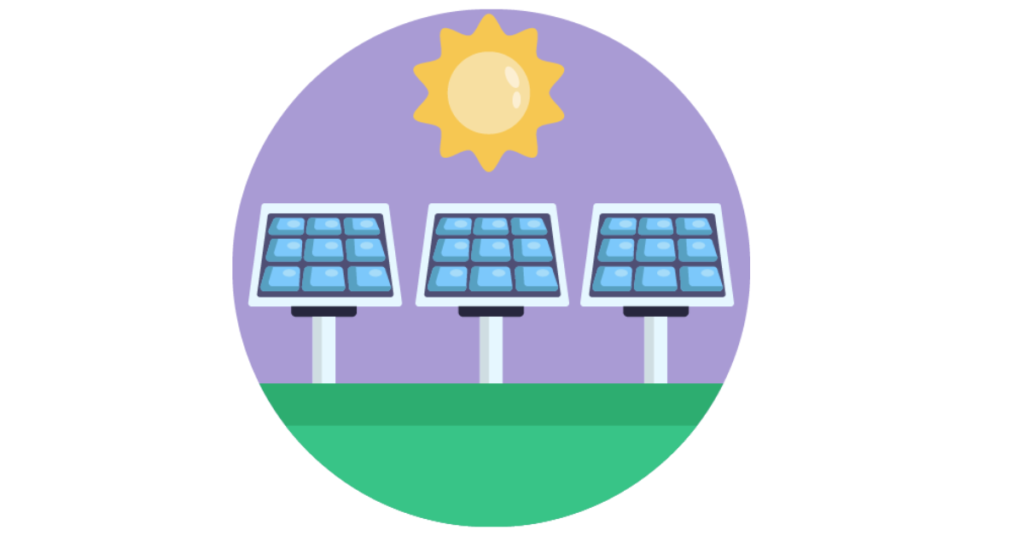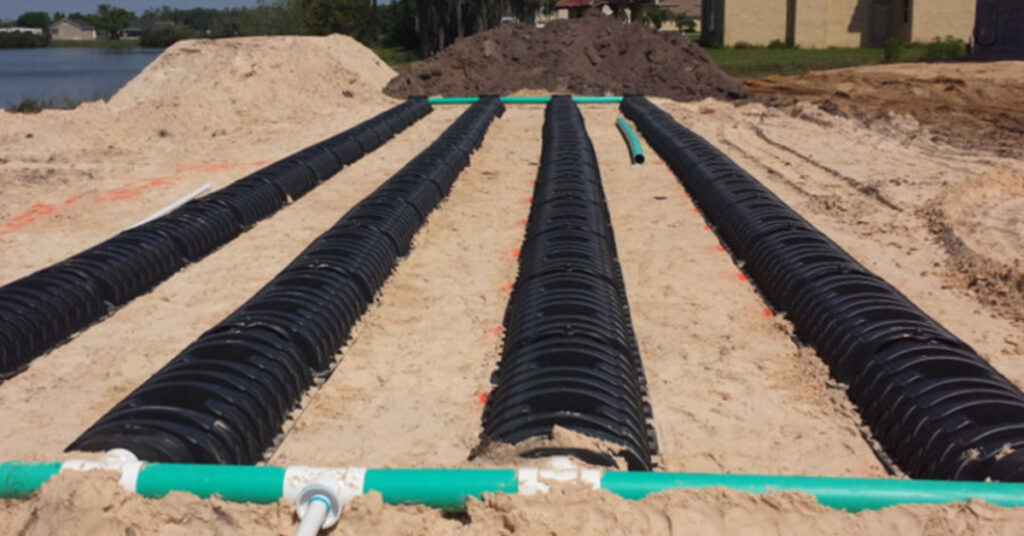Are there any other ways to install solar panels besides your roof? There are situations where homeowners can’t install solar panels on their roofs. For instance, if your home’s roof is in a too-shaded area or needs more sunlight, solar panels may not be effective in generating enough electricity to meet your needs. This blog will define what a ground-mounted solar panel is, its possible installation costs, advantages, and disadvantages.
What is a ground-mounted solar panel system?
Solar panels mounted at ground level are known as ground mounted solar panels and function like their rooftop counterparts. These systems capture sunlight, which is then converted into electricity via solar cells, providing power to individual buildings or entire communities in the case of solar farms.
Listed below are the three most essential facts regarding energy production through ground-mounted solar panels:
-
Ground mounted solar panels are often the optimal choice in numerous situations.
Although rooftop solar panels are popular among homeowners, numerous factors make ground-mounted solar panel systems worth considering.
Typically, ground-mounted solar panels are more expensive per watt than rooftop panels due to additional labor and work required. Nonetheless, properties unsuitable for rooftop solar may benefit significantly from ground-mounted systems, leading to greater long-term savings.
Solar arrays installed on rooftops are limited by the roof’s characteristics. If the angle isn’t optimal, the roof faces a direction other than south, or there are obstructions like skylights or chimneys, the solar array will have reduced productivity. Ground-mounted solar panels can be located in areas with optimal conditions for maximum output.
Should your household demand considerable electricity, your home’s roof may not accommodate a solar energy system that fulfills your requirements. Ground-mounted solar systems offer an unrestricted space advantage, allowing them to be tailored to match your electricity consumption needs.
-
Ground mounted solar panel systems are sometimes different.
Two fundamental categories exist for solar panel systems that are grounded:
The conventional method of ground-mounting solar panels involves erecting metal frames driven into the ground to keep them in place at a fixed angle. Although some standard ground-mounted solar panel systems can be manually adjusted a few times annually to account for seasonal movements of the sun.
Solar panels mounted on poles are designed to raise panels higher off the ground and support multiple solar panels on a single pole. This type of solar system is commonly used to incorporate tracking systems that automatically adjust the angle of the panels to optimize the amount of sunlight they receive.
By incorporating tracking systems into your solar panel setup, you can experience significant production increases of up to 40 percent. Ground-mounted arrays provide the option of either a single-axis or a dual-axis tracking system. With a single-axis system, your solar panels follow the sun throughout the day as it moves across the sky. On the other hand, a dual-axis tracking system can adapt to seasonal changes in the sun’s position.
-
Ground mounted solar panels provide multiple benefits
Opting for a ground-mounted solar panel system offers multiple advantages, even if you’re a suitable candidate for a rooftop solar energy system.
Installing ground mounted solar panel systems is relatively simple since they can be on open land. Unlike roof-mounted systems, there’s no need to drill holes, and the lightweight bracings used in standard ground-mount systems can be easily removed. However, if you choose a pole-mount installation, the bracings will be installed more securely.
Another benefit of ground-mounted solar panel systems is their higher productivity per panel compared to rooftop solar arrays. As they are not confined to your roof, these panels can be installed at the optimal angle for maximum energy production. This leads to a higher electricity output than a rooftop system of the same size, translating into greater cost savings over time.
Convenience is a chief benefit of ground-mounted solar panels, as they can be easily accessed for cleaning and maintenance. In snowy regions, quick and easy snow removal from solar panels is a major advantage.
Ground-mount solar energy systems are a popular option many installers offer, with standard ground installation costs comparable to rooftop solar setups. While additional upfront payment is required for tracking systems, the surge in electricity production often makes them a cost-effective choice for homeowners.

Advantages versus Disadvantages of Solar Panels Installed on the Ground
Should you be contemplating a ground-mounted solar system in favor of a rooftop installation, it’s vital to understand the advantages and disadvantages inherent in these systems. Determining which option is best for you will ultimately rely on your specific requirements and the constraints set by your chosen solar provider.
Benefits of Solar Panels Installed on the Ground
An advantage of freestanding solar panels lies in their ability to optimize exposure to sunlight. You can enhance energy production by choosing the orientation of your ground-mounted system, even if your roof is not ideally angled or oriented. Ground-mounted systems also operate more efficiently than their rooftop counterparts. This is due to increased air circulation beneath the panels, which helps keep them cool. In addition, maintenance for ground-mounted systems is simpler and more cost-effective as installers can access them with greater ease.
Drawbacks of Solar Panels Installed on Ground
Rooftop solar systems have a distinct advantage over ground-mounted alternatives. By utilizing unused space on your roof, you can avoid the issue of needing to allocate valuable land for the system. This can be especially challenging for homeowners who use that space for gardening, recreation, or farming. Additionally, freestanding solar panels are more susceptible to damage from wildlife or people tampering with the equipment. Finally, ground-mount solar systems are pricier than rooftop systems.
Other questions about ground-mounting solar panels
How Much Do Ground Mounted Solar Panels Cost?
The cost of freestanding solar panels varies widely. Homeowners can expect to pay at least $17,000. Businesses or communities looking to build a solar farm can expect to pay between $800,000 and more than $1.3 million: well above the average cost of a residential installation of $20,474.
How far are ground-mounted solar panels from your home?
Standalone solar panels are great for installing away from your home. The only caveat here is that the farther your home is from the structure, the more wiring you’ll need, adding to the cost of the system. Also, the further away the panels are from the house, the more likely you will need thicker wire (which costs more) to make up for losses in output over distance.
Another thing you should consider relative to distance is trenching. When you install panels on the ground, there is excavation to account for digging the post holes and burying the conduit connecting the panels to the property’s electric service.
You should also be mindful of any concrete between the solar panels and the structure where the electric service is found. If there is any concrete between the two points, chances are that you will need to cut through concrete, which of course, will increase the cost.
Is your house on septic?
If your home sewage is on septic and you want to install solar panels on the ground, you will want to find the leach field because you won’t be able to install solar panels over the leach field. In the past we have seen cases where the homeowner wanted to install on the ground but were unable to because the only space available was over the septic leach lines.

Example of a leach field.
Are ground-mounted solar systems worth it?
Ground-mounted solar systems are an excellent option for those interested in solar power. Although they cost more than roof-mounted systems, ground-mounted systems allow you more freedom in the location and placement of your solar panels. They can be designed and installed for optimal production and are not limited to roof spacing and orientation. However, you should ensure enough land to install the system with ample sunlight. Regardless of where they are installed, be it on your roof or a vacant lot, installing solar panels can significantly impact your energy consumption and potential energy savings.
There are pros and cons to both roof and ground-mounted solar panels. It is essential to weigh the pros and cons before deciding one option. At DroneQuote, we want to make sure you make the right decision for your specific needs. We give you detailed information about your solar system so you can make an informed decision.
Don’t wait – start going solar with DroneQuote today!
